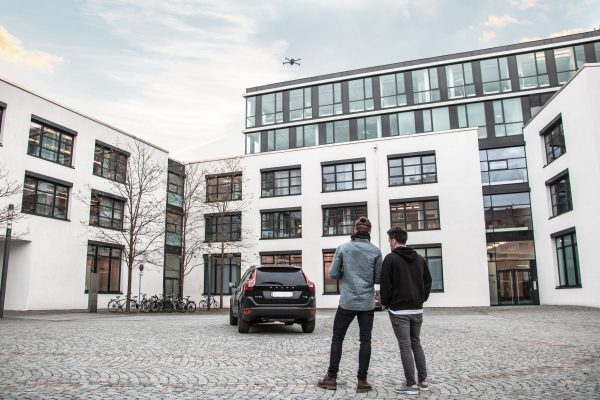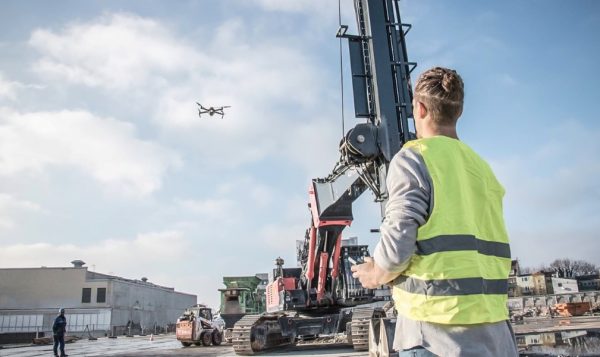With the Fairfleet platform, the Munich startup connects drone pilots with people who need aerial imagery and smart data analysis. A wide range of industries including real estate, insurance, energy and agriculture use Fairfleet for damage assessment, inspection and monitoring. The young company was founded in 2016 by Florian Waubke, Marco Kreuzer, Dario Manns and Alexander Engelfried and has won over quite a few investors. Our Seven Questions were answered by Florian Waubke, co-founder and CEO of Fairfleet.
Munich Startup: Who are you and what do you do?
Florian Waubke, Fairfleet: We are a full-service provider of drone services. Our platform covers the entire process as a ‘one stop shop’: That includes booking, flight clearance, the actual flights and subsequent data analysis. Anyone wanting to book a drone flight and data analysis within 30 seconds is in good hands with us.

Our B2B customers benefit from our global network of licensed and insured drone pilots with guaranteed legal security for every flight. We also want to perform autonomous flights in the future.
Since launching in mid-2016, our network has grown significantly. With more than 2,500 certified, insured and professional drone pilots in 52 countries, we have the largest European network.
Drone flights as a “unique service”
Munich Startup: But that’s nothing out of the box!
Florian Waubke: The way we offer the service really is out of the box, in Europe at least.
While successful examples do exist in the US, here in Europe the field is still in its infancy. It currently consists of very specialized service providers and very local networks. Besides Fairfleet, no one offers comprehensive drone services across all industries using a simple ordering process. What we’ve ultimately done is turn a complex product into a service that can be booked easily.
“Fairfleet is tapping the European market”
Munich Startup: What has been your biggest challenge so far?
Florian Waubke: Startups face lots of challenges in general. A major one for us is standardizing our product as much as possible. That is the foundation for improved scaling.
And that also involves the issue of us being subject to certain rules when flying. We always abide by them. At the same time, we’re accelerating and digitizing these processes with the relevant authorities.
Moreover, we as Fairfleet are also developing the market in Europe. That requires a lot of work to convince customers, partners and investors, but is also what makes it such an interesting field.
And our biggest customer challenge? That was a pipeline flight last year. It required dozens of requests and forms to begin with, and the authorization process took more than a year. But it also has to be said that it was the first Beyond Visual Line Of Sight (BVLOS) flight in the history of German aviation.

Standardizing processes to scale
Munich Startup: How is business going?
Florian Waubke: Our revenue doubled in 2019 compared to the previous year. We’re now also active in 52 countries with more than 2,500 professional pilots. And we’ve been able to capture further industry segments with approximately 30 standardized services.
Munich Startup: What does Munich mean to you?
Florian Waubke: Munich is our home. The majority of the team are Munich natives and our office has a view of the Großmarkthalle in the beautiful Sendling district.
From a business point of view, Munich puts a great number of major corporations with potential for collaboration right on our doorstep as well as a startup scene that’s becoming more prominent each year with helpful networking events.
“Uber model for drones — with data intelligence”
Munich Startup: How will your startup become the next unicorn? Or will we be seeing you at an Epic Fail Night soon?
Florian Waubke: Fairfleet needs to continue to develop structures both internally and externally so standardized products can be handled on the platform using standardized processes with a high degree of automation.
That will get us to the point where we can offer flights internationally with a genuine mass market model. You do need to be somewhat careful with this type of service, but in the end, we’re building an Uber model for drone flights — with a lot of data intelligence on top.

We’re not familiar with the Epic Fail Night. To keep it that way, we need to listen to our customers and partners really well, collect feedback and do business in a very “customer-centric” manner. We’d rather take a step back to analyze and think about things one more time than ruin everything by going full throttle.
Munich Startup: Early birds or late risers?
Florian Waubke: Early birds, no question about that!



